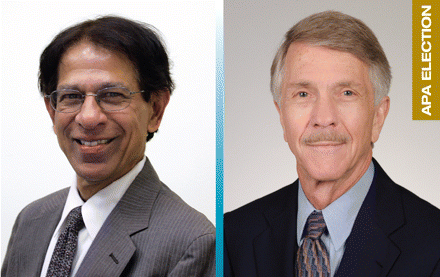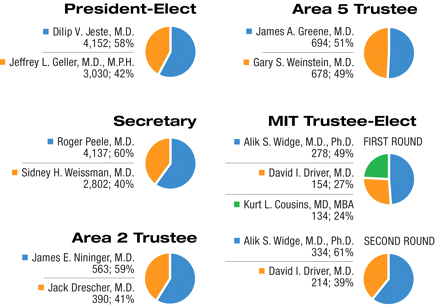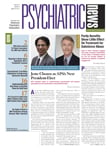At a time when multiple facets of psychiatric and other medical practices are facing substantial changes, APA members have chosen a leader with broad experience as an educator, clinician, and researcher and in a variety of APA components.
Dilip Jeste, M.D., who last month learned that he had been voted the next APA president-elect, is a distinguished professor of psychiatry and neurosciences at the University of California, San Diego, where he established the geriatric psychiatry program and is the Estelle and Edgar Levi Chair in Aging. He has also been elected a member of the Institute of Medicine.
His extensive research studies in psychosis and in geriatric mental health have garnered awards from APA and other organizations. He is a member of the DSM-5 Task Force and a former member of the Board of Directors of the American Psychiatric Institute for Research and Education.
Jeste will officially become president-elect at the close of the this year's APA annual meeting in Honolulu on May 18, at which time the current president-elect, John Oldham, M.D., will succeed Carol Bernstein, M.D., as president.
Jeste's opponent in this year's president-elect race was Massachusetts psychiatrist Jeffrey Geller, M.D., who received 42 percent of the vote to Jeste's 58 percent.
Jeste recalled in an interview with Psychiatric News that while growing up and attending medical school in India, he never imagined being able to join such a large and prestigious organization as APA. Now, many years later, being chosen to lead the organization "is a dream come true. I am honored and humbled," he said.
He noted that his priorities for APA during his president-elect and president terms fall into two areas—"serving patients and serving the members." In regard to the former, Jeste stressed that APA needs to be extremely diligent, at a time when the final shape of health care reform is uncertain and budgets are being slashed, that mental health care does not become a victim. He said it will be key to work with other medical and advocacy organizations to "make sure that the mental health parity law has teeth" and isn't weakened in the regulatory process.
In the member-relations area, Jeste described APA as a "big umbrella with many constituencies," adding that the Association needs to do a better job of communicating with its members on various issues of concern to them. Crucial targets for improved communications, he noted, will be residents, early career psychiatrists, and members of minority groups, with a focus on helping them become APA's and psychiatry's future leaders. He also plans to work more closely with psychiatric subspecialty organizations to have them feel more involved in APA.
Elections Held for Other Positions
The position of secretary was also decided in the recent election, and the incumbent, Roger Peele, M.D., of Maryland emerged the victor, besting Chicago psychiatrist Sidney Weissman, M.D. Peele garnered 60 percent of the vote to 40 percent for Weissman.
In addition, two of APA's seven Areas held election for Area trustee. In Area 2, which includes all of the district branches in New York state, the current Area trustee, James Nininger, M.D., outpolled challenger Jack Drescher, M.D., by 59 percent to 41 percent, to win a second three-year term.
This year's closest race was in Area 5, which includes the Southern states plus Puerto Rico, as well as the military district branch. In this Area trustee race, James Greene, M.D., of Tennessee defeated past Assembly Speaker Gary Weinstein, M.D., of Kentucky. Greene received 51 percent of the vote to 49 percent for Weinstein.
The contest to be the next member-in-training trustee elect (MITTE) involved a trio of candidates and thus triggered APA's preferential balloting procedure. University of Washington resident Alik Widge, M.D., Ph.D., emerged the victor with 61 percent of the votes after those for third-place finisher Kurt Cousins, M.D., a resident at the University of Maryland, were redistributed between Widge and second-place candidate David Driver, M.D., a resident at Georgetown University Hospital. At the end of the upcoming APA annual meeting, the current MITTE, Sarah Johnson, M.D., will become the member-in-training trustee for a one-year term.
About 25 percent of eligible voters cast ballots this year, down from about 31 percent during the last two elections. A major increase was seen in the number of ballots that were cast online. While 50 percent were submitted online last year and 42 percent in 2009, this year's election saw 77 percent of voters casting online ballots.
Referendum Initiative Fails
Also on the ballot this year was a member-initiated referendum about upcoming maintenance-of-certification (MOC) requirements that have been issued by the American Board of Medical Specialties and the American Board of Psychiatry and Neurology (ABPN).
The goal of the petitioners was to hold a referendum on the issue of having APA register with the ABPN the dissatisfaction of APA members with elements of the new requirements concerning patient feedback and several other mandates that will have to be met for psychiatrists (and all other physicians) to maintain their certification.
The petitioners' statement called on APA to hold a referendum stating that APA should inform the ABPN as follows regarding MOC requirements:
"The patient feedback requirements for the purpose of reporting to the [ABPN] is unacceptable, as it creates ethical conflicts and has the potential to damage treatment.
The requirements other than a cognitive knowledge examination once in 10 years, regular participation in continuing medical education, and maintenance of licensure, pose an undue and unnecessary burden on psychiatrists."
Support for the referendum statement was strong, with 80 percent of voters favoring it. The referendum failed, however, because with only 25 percent of voting members casting a vote, it fell far short of the requirement that for a referendum to be adopted it must receive the votes of at least 40 percent of voting members.


